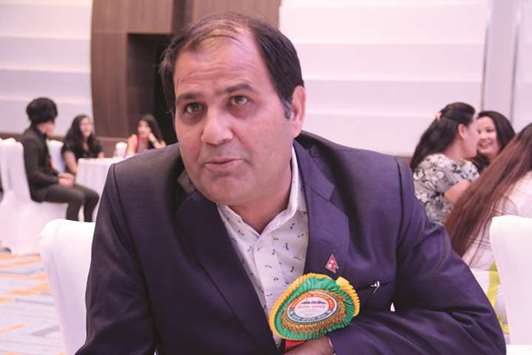Manoj Gajurel, a known Nepali stand-up comedian, has impersonated and mimicked countless international figures in his long career. Recently, he was in Qatar and entertained his Nepali audience with his comedy and caricatures. The comedian’s shows have earned him a lot of recognition and popularity.
During his recent visit, the Community caught up with him and talked about his work and life.
Gajurel belongs to a group of comedians called Sisnu Paani. The group often present satrical work about political and social misdoings in Nepal. Gajurel has so far performed several times in over 60 countries. In Qatar, he recently performed for the fifth time.
Dilating on his early life, he said that he was born in a middle class family. He obtained a degree in Mass Communication. His father died when he was only 20 days old. He started his career when he was just 15. Satire brought fame for him.
He started working with Radio Nepal when he was in Class-VIII. Some years later, he started presenting a comic show in the radio which became a hit. Thereafter, he started showing his skills on television.
Gajurel humbly gave all credit to his mother, who provided him with love and care single-handedly.
“All that I have achieved is because of my mother,” he said.
Gajurel said he had also penned five books namely, Lukhasta, Hanuman, Brain, Jokes Sastra and Sisnu Paani. All of his books stress on the need for social and political awareness.
Gajurel also got appreciation from Pushpa Kamal Dahal, Supremo of Nepal Communist Party (Maoist) and former prime minister of Nepal. The caricaturing of the ex-prime minister was applauded by the people. He also faced criticism and sometimes received threats from the supporters of high profile figures he made fun of. “I enjoyed the threats because if someone threatens me, it means I am on the right track,” Gajurel said.
Gajurel said he always took care of his hairstyle and make-up personally. Now-a-days, the working environment is very good in Nepal. He targets different political figures in the country. Gajurel admited that impersonating political leaders was the most difficult part of his acts.
For this purpose, he has had to study the lip movements, walking styles and mannerisms of certain people watching television constantly. Having wanted to become a politician himself, Gajurel said, “Being a politician is less difficult than being an actor.”
He said that comedy was one of the best means of creating social transformation and influencing academicians, researchers, policy-makers, governments, donors and civil society activists.
He does not only poke public figures but also brings serious discourse to the mainstream. His acts are mixed with deep humour and the sense of socio-political awareness.
About the threats he had received, the comedian said, “The most number of threats came when I was imitating a high profile figure that ruled the roost in 2006.” At that times, there was huge censorship in Nepal. He added, “During that time, I moved from one place to another to hide. On the other hand, I smell success whenever people feel my acts are real and appear threatening to the person I am impersonating.”
Gajurel has millions of fans across the country and abroad. He has received many honours, medals and appreciations.
“They [comedian] reflect who you are. Comedians are indirect activists of the society whose wisecracks shake you a little and you are forced to come out of the cocoon.”
Gajurel sums up his philosophy and says, “I always want people across the world to be happy. I request all Nepali expatriates in Qatar to be happy, love their families back home and crack jokes sometimes”.

COMEDIAN: Manoj Gajurel
